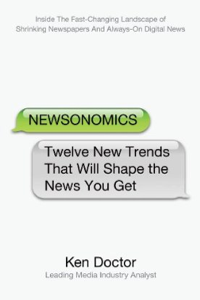 [Here’s our final excerpt from Ken Doctor‘s new book, Newsonomics: Twelve New Trends That Will Shape the News You Get. It’s a Q&A with Nancy Shute, a veteran science writer who is adjusting to life as a specialist in the new media world. —Josh]
[Here’s our final excerpt from Ken Doctor‘s new book, Newsonomics: Twelve New Trends That Will Shape the News You Get. It’s a Q&A with Nancy Shute, a veteran science writer who is adjusting to life as a specialist in the new media world. —Josh]
Nancy Shute, a twenty-year veteran of U.S. News & World Report, has covered science and medicine for national publications for more than twenty years. Many of us focus on national news, local news, economic news, and the like, but science news greatly impacts our lives. It, too, is suffering in the news traumas we’re seeing.
Usha McFarling, a science journalist who won a 2007 Pulitzer Prize for explanatory writing, argues that “media atrophy” is reducing the discourse on vital issues — at the worst possible time. In her reportage on climate change she showed how vested interests (from both the right and the left side) “hijacked” the story to fit their agendas, but not serve the public overall.
Nancy Shute is familiar with these issues. She has produced multimedia packages and has been a guest on NPR, CNN, CBS, NBC, WETA, and WTOP. Now she serves as a contributing editor for U.S. News & World Report, where she writes the OnParenting blog.
Q: For science and medical journalists, what new opportunities has the web opened up?
A: The web has transformed science and medical journalism. Just ten years ago we followed the major medical journals by waiting for copies to plop into the mailbox. Now we follow global efforts to quell the 2009 swine flu outbreak on email networks like ProMed, as well as the Center for Disease Control’s emergency Twitter feed, dozens of blogs written by epidemiologists and physicians, and streaming video from Health and Human Services.
Medical information has become much more accessible, thanks to open-access journals and large online databases such as those at the National Library of Medicine. I can find patients to interview on Facebook and other social networking sites. Science and medical writers are also much better connected to each other thanks to social networking sites like Facebook and Twitter, which should help improve the quality and accuracy of our work. It’s certainly making our daily life a lot more collegial, and fun.
Q: Are we entering into a new gig economy for journalists, in which they have to piece together a number of jobs, rather than shooting for one and holding on to it?
A: Many science writers already have entered the gig economy, a trend that started well before our current media meltdown. In the early 1980s, the membership of the National Association of Science Writers was dominated by staff writers for newspapers and newsweeklies. Now two-thirds of NASW members say they’re freelancers. Many of those independent journalists are doing very well, with clients in multiple sectors, including corporate, nonprofit, and academia, not just general-interest publishing.
Many are self-publishing with their own websites or blogs. I’ve joined the gig economy, too. After twelve years at U.S. News & World Report as both a senior writer and assistant managing editor in charge of the magazine’s science and technology coverage, I’m stitching together gigs that include blogging for U.S. News, freelancing for some print publications, teaching journalism and science writing, and testing business models for a health news startup.
Q: What do you tell young journalists about the trade they are now getting into?
A: What a fabulous time to get into journalism! You’ll be building the future of our trade! It’s like “All the President’s Men,” “High School Musical,” and the founding days of Google all rolled into one. And if you just don’t have the stomach for a startup, that’s fine, too. There are still jobs out there for good writers, editors, and designers, and many of them are for print publications. We readers still need you.
Q: What lesson in digital media do you wished you’d learned faster?
A: I wish I’d made myself learn one new digital skill a month, even if it was just a tiny one like cropping in Photoshop. Since the skills and tools are constantly evolving, the old “next year I’ll learn Audacity” approach just doesn’t cut it; it’s too easy to let my awareness of new tools slide, and then feel overwhelmed. Having said that, I’d better step up. This weekend, I vow to build a new website using WordPress!
From Newsonomics by Ken Doctor. Copyright 2010 by the author and reprinted by permission of St. Martin’s Press, LLC.